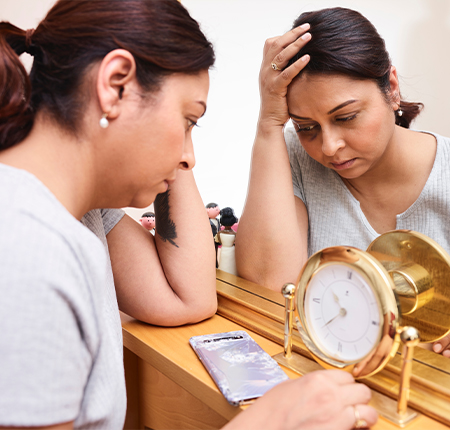
Burnout Syndrome - Symptoms, Causes & Treatment
Feeling overwhelmed, exhausted, stressed? You're not the only one going through this and it's time to understand why your body reacts the way it does.
Burnout is a real psychological syndrome that occurs as a prolonged response to chronic job stressors. Most of the time, people in burnout completely lose motivation, energy and feel unable to complete the work they have to do, sound familiar? We now discover what are the symptoms and signs of this syndrome, how to diagnose it, but also how to recover from such a period.
What is burnout?
Burnout is a complex condition associated with mental, physical and emotional exhaustion that occurs as a result of long-term accumulated excessive stress. Considered an increasingly common phenomenon in the modern world, it is now officially recognized by the World Health Organization as an occupational syndrome associated with an increased risk of hypertension, other cardiovascular diseases, depression and even suicide.
Until recently, the term referred only to the extreme risks faced by professionals in fields such as health, police, emergency situations, those dealing with trauma and human services, but today the risk category includes most people, including children and their parents, with manifestations within the family.
The problem must be treated seriously and responsibly, so it's time to pay more attention to your feelings, your well-being, but also your health. They are all puzzle pieces of your happiness.

Burnout - Symptoms & Signs
The first three signs to look out for are burnout, detachment, and inefficiency. Easy to say, not so easy to reunite, we know.
Mental and physical fatigue
The first thing you might notice is that you are exhausted all the time. In fact, left unchecked, fatigue can quickly turn into chronic depression and affect many aspects of your life. This type of exhaustion can also manifest itself physically in an increased vulnerability to cold, flu, nausea and headaches.
Cynicism and detachment
You may suffer from burnout syndrome if you are constantly preoccupied with work-related thoughts, but without being solution-oriented, only problem-oriented. You may also notice increased pessimism, lack of confidence, and the emergence of feelings of isolation and disconnection from other people and your environment as signs of burnout.
Decreased professional/school performance
One of the consequences of a prolonged state of exhaustion and damage to the nerve circuits at the level of the prefrontal cortex, is the decrease in productivity and performance at work or school.
Lack of motivation
One of the most common symptoms of burnout is the inability to find the inner resources needed to complete tasks at work. Of course, the manifestations differ, so it can also be that you check off your tasks, but you do it late or incompletely.
Obsessive work
At the opposite end we have the continuation of preoccupations and doing work even after hours, in the off hours, to make up for delays. These activities take place at the expense of your body's hours of relaxation and relaxation.
Cognitive problems
It is not unusual if you notice a decrease in your ability to concentrate, organize and pay attention. You forget things, or you hardly remember them, you can't concentrate and it all leads to personal and professional failure.
Changing sleeping habits
If you experience insomnia, frequent awakenings, changes in your sleep schedule, you should know that these are warning signs of mental and emotional exhaustion.
Negative emotions
Frustration, irritability, disappointment, devaluation, irritation, criticism, lack of perspective, the feeling of emptiness, these feelings become dominant when you face professional burnout.

Interpersonal problems
Conflicts may arise both at home and at work, your tolerance may decrease, or you may avoid talking to colleagues or family members.
Lack of concern for you
When the burnout phenomenon occurs, people tend to put themselves second and make the most unhealthy choices: fast food, alcohol, smoking, white nights. Even self-medication can become a problem if, for example, you cannot give up sleeping pills, alcohol or coffee.
Decreased quality of life
As expected, a lifestyle in which burnout is dominant, problems such as lack of personal, professional satisfaction, feeling useless and blockages become a daily problem.
Health problems
Most worrying are the long periods of burnout that lead to severe chronic stress. It can create real health problems such as headaches, migraines, digestive problems, heart disease, diabetes, depression and even obesity.
The symptoms and signs your body is giving you may be exactly these or completely different. It is important that you take a moment to listen and understand whether or not there is a problem.
How does burnout affect menstruation?
As we talked about earlier, your body can also send you physical signals that something is wrong. Among these signals are hormonal imbalances that can be triggered emotionally, usually due to prolonged stress. Unfortunately, the hormonal imbalance then leads, in the case of women, to consequences related to the menstrual cycle.
Countless women report that their periods are heavier and the pain is more intense when they are going through a difficult period, when they are exhausted or stressed. To understand even better how hormonal balance works, but more importantly, what to expect in the event of an imbalance, we invite you to read our article that will answer all your questions.
And if you feel like today is the day you make a change in your life, how about starting from the most sensitive area of your body? Your intimate area deserves special attention, it deserves care and love, it deserves to feel only the touch of nature, not that of plastic.
Unfortunately, the classic products on the store shelves are not safe for your health and use chemicals that affect your bacterial flora, unbalance the pH value and leave room for infections in your body. Itching, severe pain, irritations, say NO to all problems and let yourself be swept away in the world of ENROUSH , where organic, quality care for you and your body is a "must", not a "nice to have".

Convince yourself from our clients:
Friendly to you and the planet, at ENROUSH you will find only natural products, created from GOTS certified organic cotton, which do not put your health at risk, not even for a second.
How do you do Burnout?
A person who reaches burnout goes through several stages. These include:
strong need for affirmation
neglecting personal needs
the occurrence of conflict situations (at home or at work)
denial of problems
isolation from family and social group
behavior change
self-devaluation
the feeling of inner emptiness, of personal waste
depressive states
physical and emotional collapse

There are three types of burnout, namely:
- individual burnout, caused by excessively negative self-talk, neurosis and perfectionism;
- interpersonal burnout, caused by difficult relationships with people at work or at home;
- organizational burnout, caused by poor organization, extreme demands and unrealistic deadlines, which make you feel that your job or career is in danger.
Other causes of professional burnout are:
unclear responsibilities and expectations from the manager;
time pressure, unreasonably;
unmanageable workloads (on your own) or time management deficiencies;
lack of communication and support at work;
rude and uncaring colleagues or leaders;
unfair treatment, non-recognition of merits and efforts;
lack of proper demarcation between work and free time.
If you identify with the proposed scenarios, don't panic. We also have treatment methods for you and tell about them right away.
Who is more prone to burnout?
Some people may be at high risk of suffering from burnout due to genetic predispositions or difficult moments in life: trauma, divorce, death). Even personality traits such as pessimism, perfectionism, emotional lability, reduced ability to adapt to stressful situations, the need to be in control, competitiveness, they also have a negative contribution and can amplify the effects of professional burnout.
Burnout syndrome - risk factors
The following factors can contribute to burnout at work:
You have a heavy workload and work long hours.
You struggle with work-life balance.
You work in a helping profession, such as health care.
You feel you have little or no control over your work.
Of course, these risk factors are in reality largely within your control, only when you experience burnout, you no longer realize this.
How is burnout diagnosed?
The clinical picture of burnout syndrome is not easy to describe. It differs from person to person, but essentially represents a set of symptoms of social dysfunction and psychosomatic and somatic disorders. What does this mean?
Burnout presents three major categories of stress symptoms: physical exhaustion with the presence of physical symptoms, emotional exhaustion with the presence of symptoms related to attitudes and feelings, and behavioral symptoms that lead to low productivity, dissatisfaction at work.
Currently, there are no well-studied methods to determine the diagnosis of burnout syndrome. However, especially in the online environment there are numerous questionnaires for self-assessment such as the "Maslach Burnout Inventory" (MBI), available for various professional groups, but not accredited to be used as a diagnostic test.
The symptoms of burnout can be easily confused with those of mental disorders such as depression, anxiety.
The consequences of untreated burnout syndrome
Ignoring the signs of burnout or delaying treatment can have significant consequences, including:
- Excessive stress
- Fatigue
- Insomnia
- Sadness, anger or irritability
- Alcohol or substance abuse
- Cardiovascular diseases
- High blood pressure
- Type 2 diabetes
- Vulnerability to disease
Such cases arise when, for too long, you refuse to talk to a specialist or even make decisions yourself that could improve your lifestyle. The first step is to understand what you feel, then act on it for your own good.
What is the difference between burnout and other conditions?
As we mentioned earlier, burnout can easily be confused with other mental illnesses or disorders. So, let's find out together what the differences are.
The difference between Burnout & Depression
Both burnout and depression include excessive fatigue, increased sadness, and reduced performance at work. What makes burnout different is that, more often than not, it occurs against the background of problems at work. In depression, on the other hand, negative thoughts are linked to all aspects of life.
Depression is also manifested by low self-esteem, a sense of the futility of life, and sometimes suicidal tendencies. These are not typical symptoms of burnout syndrome, but excessive professional exhaustion can increase the chances of becoming depressed. 
The difference between Burnout & Anxiety
Anxiety is the feeling that distances you from the things that frighten you, it is the state of fear, generalized, that anticipates discomfort or unpleasantness. Basically, when anxiety is related to the workplace, it fuels the negative feelings you feel and then leads to burnout.
And more ways in which you can calm your mind or methods by which you can understand if you suffer from anxiety can be found in the magical article HERE.
The difference between Burnout & Stress
If stress is the result of transient tension, burnout is the result of permanent tension. Burnout can be considered the final stage of a breakdown in adaptation, developed over time due to long-term exposure to professional stress.
Stress exists independently of burnout and can be easily overcome if managed effectively. Conversely, poor management leads to burnout, especially in the context of a demanding job.
The difference between Burnout & Chronic Fatigue
Although they are very similar, the difference between burnout and chronic fatigue is that the former is definitely related to the professional aspect of life, while the latter can manifest itself even in the absence of stress at work, as a combination by several factors.
Chronic fatigue is caused by an amalgam of factors related to work, family and other aspects of personal life. On the other hand, burnout is caused by job-related aspects, but can also extend to negative feelings about personal or family satisfaction.
Recovery - How is burnout syndrome treated?
Burnout is a permanent condition that can only change if you do something about it. Here are some steps you can take to overcome this period in your life:
Identify the stressors in your life and reduce the unnecessary, secondary ones.
Review your priorities and make sure they are realistic and connected to your larger goals.
Structure your day better, create a plan and stick to it.
Create an end-of-workday ritual to make it easier to separate work from your personal time.
Focus on progress, not just the end goal.
Practice a hobby every day, at least for an hour.
Make sure you get as much rest as you need.
Spend more time with loved ones, friends or family and disconnect from professional stress.
Meditate for a few minutes every day to relax your body.
Seek support from loved ones, people you trust, or a support network.
If you feel that the small changes you are making in your lifestyle are not having the desired effect, try to find a therapist with whom you can open up and with whom you can better understand your emotional journey.






















